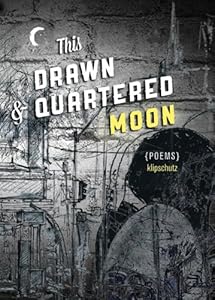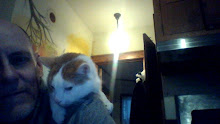A Conversation Between Iowa-Based Canadian Poet Jon Cone And San Francisco-Based Poet Klipschutz About His New Collection THIS DRAWN AND QUARTERED MOON (Anvil Press, 2013)

JC: There’s a sweep to your new book, many
forms, many subjects – San Francisco, sex, Viet Nam, alienation of the self by
digital means, larger political history from the 60s to the present, poets and
heroes of pop culture, domestic bliss and its opposite – I could go on. To me,
it has, for lack of a better term, ‘a novelistic breadth’.
K: I’m a
frustrated playwright, essayist, short story writer, pundit, Casanova, cultural
anthropologist...the list goes on. Which leads to a crazy quilt of approaches
and subject matter: it all gets poured into poems. There are no conscious
themes, just inclinations, preoccupations, obsessions. It’s like being
attracted to a certain “type” of woman. I’m pretty promiscuous when it comes to
poems. The flip side is also true, of course. What type of woman – or poem – is
attracted to me? The woman, or the poem, usually has the final say.
JC: Seldom does one encounter a book of poetry
that works so many different forms. Poets, one would be inclined to believe,
prefer their books to exemplify a singular formal aspect. What are your
thoughts about form, the formal nature your poems assume?
K: I never consciously think of “form,” per
se. I go with Creeley on form being an extension of content, and try to listen
to poems, hoping they will tell me what they should look and sound like, what
clothes look good on them, whether their socks match. At times I feel like
those homicide detectives on tv who talk to corpses, asking “Who did this to
you? And why?”
JC: Was there any poem which began in one
form, only to end up in a form radically different than initially intended?
K: More than one, including “The Eternal
Present,” which closes the book. It started out as a prose poem, then had lines
breaks, then stanza breaks for extra breathing room. Brilliant fix or arbitrary
reformatting? Not for me to say.
JC: Satire appears throughout “This Drawn
& Quartered Moon.” Many times I found myself reading a poem and suddenly I
was laughing. Lines leapt out at me because they seemed hilarious, even as the
subject was serious. But Beckett, Larkin, Berryman could all be very funny,
even Plath had her darkly humorous moments. More recently Minnis, Leidner, and
Feng Sun Chen all use satire and humor in their poems. What is your approach to
humor in your poems? How does one know when it is appropriate, when it isn’t?
K: I have been accused of being “too clever by
half,” and I’m on the lookout for that tendency, especially on rewrite. There’s
a lot we can all learn from Beckett about paring back. And you’re right about
Plath’s odd humor. Good point, rarely mentioned. The comedic, I guess, works to
deflate pomposity, or to break the ice, maybe even get the reader on your side,
if you go in for that sort of thing. And it can set up a sudden burst into
different weather entirely.
JC: One of my personal favorites, humor-wise,
is “The New Library” where “ … Chief Librarian Bleep plays cards, / then
photoshops Gutenberg’s head /onto a football sailing over a goalpost.”
K: Well, thanks. That one’s based on a long
essay in The New Yorker from the 90s by Nicholson Baker, about the rebuilt San
Francisco Main Library, and the destruction of the card catalogue system, which
was championed by Chief Librarian Ken Dowlin, an ex-Marine, who wanted to turn
the whole library digital. Nicholson Baker, by the way, hates contemporary
poetry, as evidenced by his novel The Anthologist – which is more than strange,
given his own experiments with form in fiction. I handed him a version of the
poem when he read at that very library.
JC: There are also moments of delicate,
heartfelt love. “With Colette at the Edinburgh Castle” strikes me as one such poem.
It is delightful all the way through, but the ending seems special to me, a
public kiss a declaration and a rite, and the sense of homecoming for the poet.
Great Britain is home for poetry in the English language. American poetry could
not exist without English poetry. Tell me about this poem.
K: I hear British English every day, lucky me,
from my wife Colette. The English can use language as a weapon, and at times
I’m on the receiving end, which is less than fun. As to the poem, Colette has
mixed feelings about it. She thinks it portrays her as liking the occasional
drink. Which if you knew her...never mind. My friend John Lane gets the credit
for the way the poem concludes. It used to end “...hearts in Highlands, faintly
bitter halfway home.” John told me, basically, “You write so few love poems,
don’t screw this one up on the one yard line.” If it wasn’t for him, I would
have screwed it up on the one yard line.
JC: Striking poems abound in this book,
including two of the ghazals, and the prose poem “Oliver Othello King, Jr.”
What was it about the ghazal that appealed to you? And is there a context the
reader doesn’t get to see in the prose poem? It’s a powerful statement, and
seems to arrive out of poetic reportage rather than a purely poetic impulse.
K: There were eight ghazals in my previous
book. The few this time around exhausts my output. It’s an exacting form,
imported from other languages and cultures. Jim Harrison did a series that
stand up, for me anyway. How I see the form is akin to a Wallace Stevens
sensibility, theme without plot, and I’m always happy when I can channel
Stevens. Some of his poems make little surface sense, but keep drawing me back.
The problem with channeling Stevens is that if you hit the wrong button you
might tune into John Ashbery instead. At which point, god help you.
Oliver Othello
King, Jr. was a Viet Nam vet I met on public transportation. The poem was a
gift from him, completely: his experiences, his voice. All I did was write it
down. Then rewrite it for about fifteen years, trying to get out of his way.
You’re right as rain, it’s reportage, capturing about fifteen minutes of
experience, trying to bottle what felt to me like magic.
JC: Roughly midway through your book is the
poem “Elvis the First,” which seems central to me, not only physically but
thematically, historically: it reaches back to the earlier poems and prepares
the way for those that follow. What is it about this poem, apart from
chronology, which makes it such an important one, both for you personally and
for the entire book?
K: The poem is “about” Elvis Presley, but also
about my family, and reaches back to some rough times, when the ’60s were just
kicking into high gear, when my siblings and I were starting to do drugs, and
my parents didn’t have a clue how to handle us. Then my dad became Elvis’s
doctor. Maybe if Elvis had come over for dinner, as I fantasize in the poem, he
could have helped. After all, he did have that drug enforcement badge Nixon
gave him! Seriously, the poem gave me a way to write about family, and as
someone else pointed out, it encompasses four different forms in one poem,
hopefully unifying them thematically.
JC: Your poetic practice is complemented by
your songwriting. What do you consider the essential differences between
writing poems and writing songs? How does the song-practice influence your
poetry?
K: I’ve been writing songs since the
mid-1980s, and with Chuck Prophet, on and off, since about 1990. I’ve been
lucky to have collaborators who insist that a song be a song, rather than some
hybrid between poetry and music. Poetry has to carry its own music, and a song
has a melody, which is more important than the words. The words only matter at
all if the melody is memorable, or at least enticing. And songs benefit from
repetition, hooks. “Don’t bore us, get to the chorus.” Songwriting is usually
concise. Maybe it helps keep my poems from “going on,” as the English say.
JC: Such a large collection as “This Drawn
& Quartered Moon” suggests many precedents, many traditions. From your
perspective, what are the major influences that helped you when writing this
book?
K: So many influences, so much thievery. I
only wish I had incorporated, like those guys in D.C., Thievery Corporation. A
DJ duo who also own a string of high end restaurants. What a life! And we had
to be poets instead. My influences are all the usual suspects, from Homer to
Dylan, with a lot of painters and comedians and architects and baristas thrown
into the mix. Practically everybody except Whitey Bulger. Truthfully, your
whole life up to that point goes into every poem, every draft of every poem.
And my poems have to endure about fifty drafts, on the average, at my hands.
The hard part is erasing the stitches so hopefully the reader feels like the
poem just kind of happened, poured out in one sitting.
JC: The book starts with a prologue of sorts,
a “Memo To Wordsworth,” and proceeds to a survey of urban particularities, “In
Memory of Myself.” And concludes with “The Eternal Present.” Where is this
special present, is it urban, is it contemporary? Is it found in poetry, the
pursuit of poetry, quietly and diligently? Does it encompass both personal and
private, the political, the historical? Is this, ultimately, the gift that
poetry has to offer all of us – the few of us – who are alert to its
persuasions: namely, the eternal present?
K: Eliot, I think, said all cultures exist
contemporaneously, and that the present reconfigures the past, changes the way
we look at it. Which, to me, is the promise of poetry, getting across,
communicating, tying things together that felt unrelated before the poem
unifies them. For me, as a reader, the right poem at the right time can
re-enchant the world, make me see it through new eyes. Everything is
interwoven. And, as Dylan observes, broken. Poetry can’t put Humpty Dumpty back
together again, but maybe it can make something of beauty from the pieces.
JC: One final thing: Is Frank O’Hara invoked
in the opening lines of “The Eternal Present”? “8:46 a.m. 62 degrees./The
parking lots are full, the message was delivered...”?
K: Now that you mention it. I’m always on the
lookout for an opportunity to lift an O’Hara riff. His precision as to
coordinates. Why should we care what street he is walking down, and when, what
book he is carrying, and who he is going to visit? But we do!
-END-
klipschutz (pen name of Kurt Lipschutz) is a native
Californian. He is the author of several previous collections, including Twilight
of the Male Ego and The Erection of Scaffolding for the Re-Painting of
Heaven by the Lowest Bidder. His work has appeared in periodicals in the
U.S., Canada, and the United Kingdom, and numerous anthologies, including The
Outlaw Bible of American Poetry. Also a songwriter, he co-wrote Chuck
Prophet’s 2112 disc, the critically acclaimed Temple Beautiful.
Labels: Anvil Press, Conversation, Interview, Klipschutz, Poetry, This Drawn and Quartered Moon


<< Home